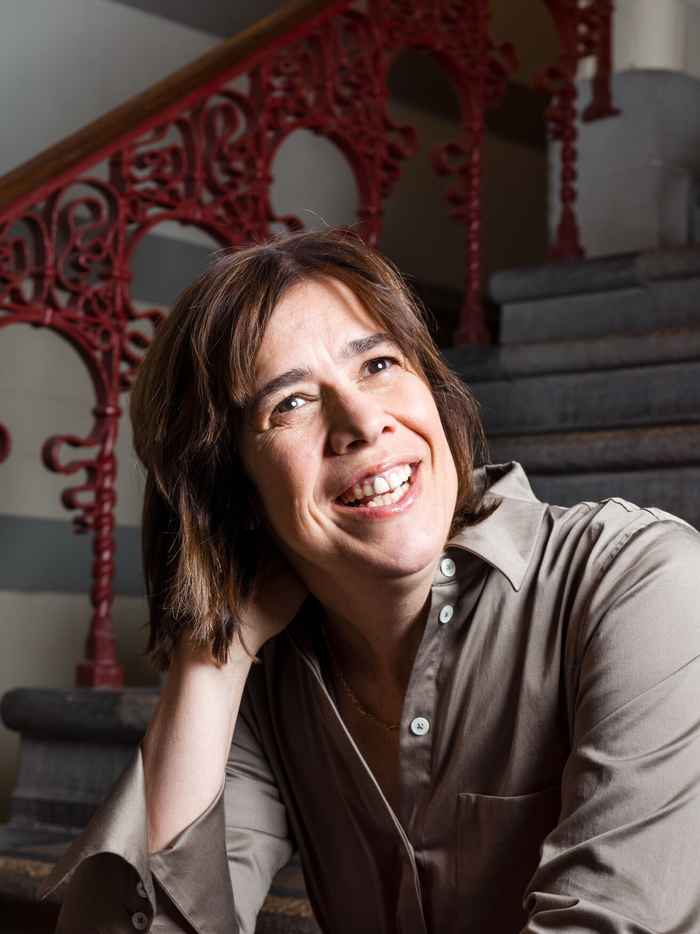Daan Roovers

Who: Daan Roovers (1970)
What? Lecturer in Philosophy and Public Affairs and Philosopher Laureate of the Netherlands
Studied: Medicine and Philosophy
First job: Saleswoman at a florist's
Favourite place at the UvA: The Oudemanshuispoort and the library on the Singel
Essential: Books
While studying Medicine, Daan took a Philosophy elective and was blown away by the passionate lecturer. She went on to complete both degree programmes. While waiting for a spot as an intern, she had the opportunity to work for Filosofie Magazine – leading her to close the door on medicine forever and begin striving (successfully) to make philosophy a part of culture.
What does philosophy mean to you?
‘Good question. A clear-cut definition doesn't exist. "Love of wisdom", "wonder", or "the exposure of self-evident truths" are a few descriptions I find beautiful and valuable. The way I define it is, "opening your mind to viewing things from another perspective". It's about a mental activity. You can also define philosophy as "the tradition of critical thinking". My first philosophy lecturer, Harm Boukema, always said: "Philosophy is the struggle against prejudices". It's about suspending your primal judgements, taking a step back from your ideas, taking a moment to circle around them and integrating as many new perspectives into them as possible. Philosophy can help promote a democratic discussion – one that involves everyone, exists between everyone and must be able to take place at different levels. It's a field that involves texts, books and contemplation. I usually come up with new ideas while I'm reading, so I try to do a lot of that, both recent and older pieces. I let the information in the books I read sink in, and I then choose my own path with that information. As a philosopher, I'm always standing on the shoulders of others. I build on their work and add my own personal twist.’
Philosophy is opening your mind to viewing things from another perspective.
How do you think philosophy can contribute to today's society?
'My work is in public philosophy. It's about looking at what's going on in society and how we should think about it. At the time, we thought of Filosofie Magazine as an instrument for furthering our mission to make philosophy part of culture. We managed to do that pretty successfully; the magazine's success has enabled us to develop many initiatives, such as the "Socrates Cup", the Night of Philosophy, the Month of Philosophy, lectures and trips. I helped come up with the title of Philosopher Laureate of the Netherlands, too. Now, years later, I've been asked to bear the title myself. I was really astonished, dumbfounded. I want to make philosophy socially and politically relevant – not because I think can create a social model from the ideas I learn from books, but because I believe we need to get everyone thinking. Democracy places high demands on citizens. Not only do you have to be well-informed, you also need to be able to form an opinion. Philosophy should ideally help us achieve that. The great thing is that philosophers are now seen as people with a broad perspective who have something to offer. For example, there are philosophers who organise programmes, work as journalists, write books, give lectures or go to work at cultural institutions.’
Philosophy means the love of wisdom.
Do you feel the university did enough to support your boundless ambition?
‘As Filosofie Magazine gained popularity, my duties moved further away from the realm of philosophy itself. I tired of that after a while, at which point I returned to the university. At the time, I was already teaching a short course at the UvA, the "Philosophy Practical". The UvA had two Master's in Philosophy back then: a Research Master's and a general Master's. I wondered what students did after graduation. There aren't that many research positions, but if that's what you're aiming for, you pursue a Research Master's. But what kind of prospects do you have with a general Master's? I proposed to develop a course for the UvA that would examine the non-academic opportunities open to people with expertise in philosophy. They gave me plenty of freedom to do this. In the Master's course that I designed, Philosophy and Public Affairs, I try to think with students about how they, as philosophers, might intervene in the public discourse. We visit lectures and places where philosophy is practised as a discipline. These trips strengthen our bond, but I also think it's good for them to see how philosophy can be practised professionally.'
If you're fortunate enough to find something you really love, you must never pass up the opportunity to pursue it.
And lastly, what is your opinion of the UvA as a place to be and work?
'I'm an independent contractor and I only teach two courses. As a result, I have to divide my attention, but I think the UvA is a nice place to work, full of strong-willed, intelligent and dedicated people. I'm struck by the degree of political involvement, also among students. Philosophy students are almost always intrinsically motivated people. You decide to study philosophy because you enjoy it and not to "become" something. That's a nice motivation, also for the lecturers. People are interested in the subject for its own sake. Make no mistake about what studying can bring out in you: if you're driven, interested and willing to work hard, you'll find your own path. It doesn't happen to everyone, but if you're fortunate enough to find something you really love, you must never pass up the opportunity to pursue it.'